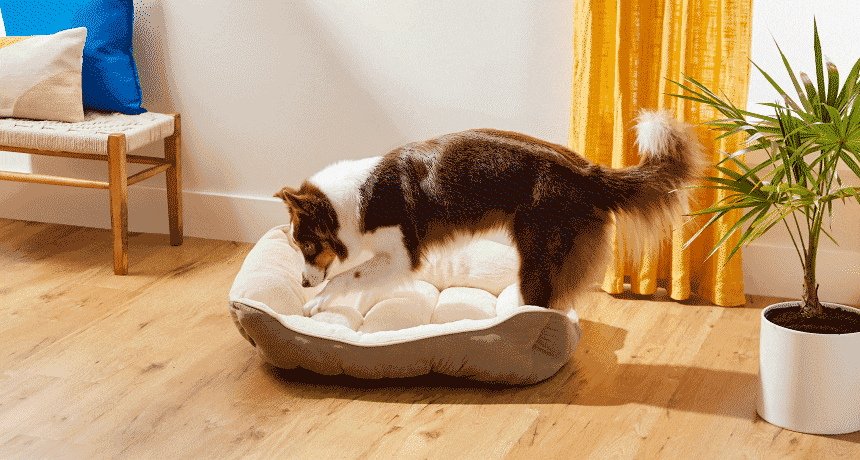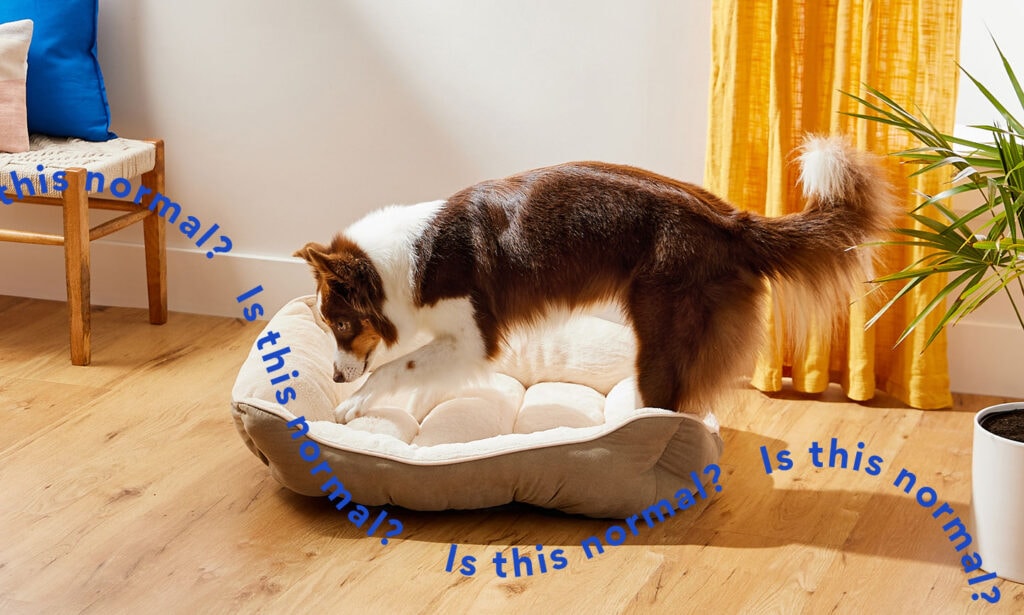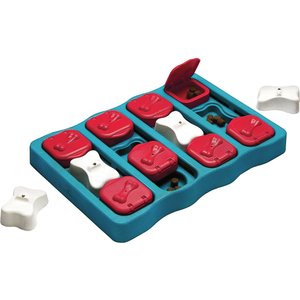Q:My dog digs in his bed every night before he settles down to sleep. Why do dogs dig in bed? Is this normal?
A: Dogs digging in bed is an instinctual behavior that usually signals they’re getting comfortable and preparing to settle in for a good sleep. It’s completely normal behavior—and pretty adorable, too!
Why Do Dogs Dig in Bed?
Whether your pooch has their own bed or they tend to take up residence next to you at night, there’s a good chance you’ve seen them digging around or walking in a circle before plunking down. This is a natural instinct our furry friends have to nest and find comfort before catching those Z’s. It might look or sound strange, but humans do the same thing when you think about it!
“Just as a human may want to fluff their pillows and blankets before getting into bed, your dog also wants to make a comfortable spot for itself,” explains dog training expert Sally Grottini. “It is also an instinct to check the ground or nesting area for things like rocks, sticks and dangerous animals.”

Dog’s ancestors used to do the same thing, notes Dr. Andrea Cermele, DVM, a veterinarian for Best Friends Animal Society.
“Their wild ancestors dug spots in the dirt in places where they could hide away from predators and harsh weather,” Dr. Cermele explains.
In cold weather, the process of digging a burrow, spinning around and curling up in it provided warmth. In warm weather, the burrow provided shade from the sun. “Your pet’s behavior can mimic this, and digging may be a way to create a comfortable cooler or warmer resting place,” she says.
Other common reasons dogs dig before bed:
- Territorial behavior: Dog digging is one way they mark their territory. “Dogs are naturally territorial,” says Dr. Cermele. “The bottom of their foot pads has scent glands and by digging, they leave their signature behind.”
- Nesting: Spayed and unspayed female dogs may exhibit this natural nesting behavior. It’s a motherly instinct to create a safe place to sleep. She may be especially prone to doing this while pregnant or if she has puppies.
- Attention seeking: A dog digging dramatically before bed could be trying to get your attention. This is especially true if it’s accompanied by whimpering, barking or lots of looks in your direction! They may want snuggles or pets.
- Breed specific: Some dog breeds are more likely to engage in this bedtime ritual than others. For example, Dr. Cermele says small terrier breeds, which were bred for tunneling and hunting, have this digging behavior deeply ingrained.
- Physical ailment: If the digging seems ongoing, your dog may have a physical ailment that is preventing them from getting comfortable. Dr. Cermele says this could indicate a medical issue such as arthritis or skin allergies, or it could be a sign their bed isn’t comfortable.
- Stress: A fidgety, digging dog might be experiencing fear, anxiety or frustration. This may be more likely if they’re in a new place, hearing loud noises, or if you’ve had recent changes to your home.
- Boredom: A dog who is not mentally or physically stimulated can get bored and restless, which may also result in fidgety digging behavior. Give your pet enough exercise and mental stimulation throughout the day so they look forward to sleeping and napping.
Is It Normal For Dogs to Dig In Bed?
Yes, dogs digging in beds is considered an instinctual hangover from their wild ancestors and is almost always perfectly normal behavior.
“Prior to dogs living with humans and having beds available, a dog would nest and have babies in tall grassy places to keep their babies safe from sight,” Grottini says. “Because of this, they would need to spin around in a circle to tamp down just the grassy area they intended to use, thereby making a safe and comfortable place among the tall grasses.”
By tamping down the long grasses, they also weeded out dangers and nuisances like snakes, bugs and rodents. And as mentioned above, wild dogs would also dig out a shallow hole in the ground, spin around and curl up in them—a process which helped regulate the temperature, and kept them warm or cool. This small hole also helped hide them from other animals.
How to Stop Dogs From Digging in Bed
Light digging before bedtime is normal and doesn’t necessarily need to be corrected. However, if you notice your dog scratches or digs for a long time—or if they can’t seem to get comfortable—something else could be going on. In that case, the behavior should be addressed so you can help your pup feel more at ease.
“If your pet scratches just a few times to get comfortable, circles and lies down, then there is really no need to intervene,” Dr. Cermele says. “If, however, the digging behavior is destructive and there could be risk of injury to your pet compulsively digging, then intervention may be needed.”
Here are some ways you can help reduce a nightly digging bonanza:
Redirect Their Digging
Because digging is so deeply instinctual, it’s tricky to stop this behavior altogether. Dr. Cermele says a more appropriate measure for pet parents is to redirect them to an appropriate dig spot.
For example:
- Create an outdoor sandbox area or other area acceptable for them to dig.
- Give them a snuffle mat appropriate for digging for food treasure.
“In general direct, them to focus on other things,” she says. “It’s important to have lots of patience and try different ideas.”
Create a Calm Environment
Excessive digging before bed can be a sign of anxiety or stress. Creating a calm, comfortable environment for your dog to sleep can help quite a bit.
Try the following:
- Play soothing music.
- Move the dog bed to a safe and quiet spot.
- Reduce external stimulants like sound and light.
- Check the thermostat to make sure it’s not too hot or cold in the house.
- Use a calming aid, such as a compression shirts—like the ThunderShirt—to help reduce anxiousness.
Get tips for creating a Zen space for your dog.
Provide a More Comfortable Bed
If your dog’s bed isn’t comfortable, they may end up doing some extra pre-bedtime digging. This could be the result of a bed that’s old and worn or is unclean. In this case, it’s best to replace the bed or give it a deep clean. The problem could also be that the bed is too small, or doesn’t suit their sleeping style. By ensuring your dog’s comfort at night, you can improve their sleeping habits and overall health.
See more Chewy customer favorites.
Provide Enough Mental and Physical Exercise
Ever gone to bed only to lie wide awake for hours? Your pup can experience something similar, and it’s more likely to happen if they haven’t gotten enough mental and physical stimulation throughout the day.
Some options to consider:
- Take nice long walks during the day.
- Head to the dog park.
- Give your dog time and space to run.
- Play mentally engaging games like tug-of-war or fetch.
- Offer busy toys.
See a Veterinarian
Dog owners should reach out to their veterinarian if they suspect their pup has an underlying medical issue. Your vet can make recommendations for lifestyle or sleep-related changes that ensure your dog’s comfort. They can also prescribe medications and supplements for issues such as arthritis or allergies.
Products to Protect You and Your Dog's Bed
Perhaps one of the biggest dilemmas of dealing with this dog behavior is that it can ruin their bed or yours. Neither are cheap, and replacing a bed can be a frustrating hassle. Here are some products and measures to protect your bed and theirs:
- Trim their nails with a dog nail clipper. Grottini says the best way to keep your dog from ripping apart bedding is to keep their nails trimmed—especially the area under the tip of the nail, which tends to grow sharply. This is something you can have professionally done by a groomer or your vet, or you can purchase a trimming tool like the Safari Nail Trimmer and cut your dog’s nails yourself.
- Use a protective dog blanket. A made-for-pups blanket draped over their bed (or wherever they sleep) can be a game changer. “Many of these are waterproof, easy to clean and are much easier to replace than expensive bedding if destroyed,” Dr. Cermele says. Try the Frisco Sherpa pet blanket.
- Invest in a durable bed. Not all dog beds are created equal. By spending a little more on a high-quality bed that can better withstand scratching and digging, you may find yourself replacing your pup’s bed less often. One option to consider? Frisco's durable couch bed.
Remember, dog digging is a completely normal dog behavior that’s left over from their ancestors. Remain loving, patient and kind with your pooch—even if they do go ham on their bed and end up ruining it—and do what you can to keep them comfortable come bedtime. See if melatonin for dogs can help with that.
Expert input provided by Sally Grottini, professional dog trainer and resident canine expert for JustAnswer in Danville, Pennsylvania; and Dr. Andrea Cermele, DVM, veterinarian for Best Friends Animal Society in Asheville, North Carolina.
Learn more about weird dog behavior:
Share:


















